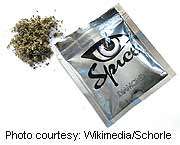Effects of this unregulated drug are unpredictable, researchers caution.
(HealthDay)—Women who use synthetic marijuana during pregnancy can develop symptoms similar to those associated with eclampsia and preeclampsia, according to a new study.
Although women with these serious prenatal conditions get better after delivery, researchers in California pointed out that pregnant women with a drug problem do not.
Synthetic marijuana, also known as "Spice Gold," is similar to marijuana, except the easily accessible drug can't be detected with a standard urine drug test. The researchers also cautioned that the effects of this unregulated drug, which is sold legally on the Internet and in herbal stores, are unpredictable.
Dr. Cindy Lee and Dr. Sally Nalesnik, from Kern Medical Center in Bakersfield, Calif., conducted research involving the case of a pregnant woman who suffered a seizure and appeared agitated. The woman, who told doctors she was about 35 weeks pregnant, had no prenatal care. She also had high blood pressure and protein in her urine, so she was treated for eclampsia. Since the baby was in distress and the only cure for this potentially fatal condition is delivery, doctors performed an emergency cesarean section.
The researchers noted that the baby girl, who was born at 28 weeks gestation, screened negative for drugs. The day after delivery, however, the woman had not recovered and needed psychiatric intervention for psychotic behavior.
"This was an interesting yet confusing presentation," Lee said in a news release. "We wanted to report it so in the future if something similar came up, it would be in the literature and physicians could refer to it."
Additional lab work revealed that the woman, who screened negative for drugs, had very low potassium levels. An anonymous caller, however, informed her doctors that the woman regularly smoked Spice Gold.
"This was not a pregnancy problem but a drug problem," Lee said. "Eclampsia is cured with delivery of the baby, but she did not get better after delivery."
The researchers concluded that obstetricians and gynecologists need to be aware of emerging drugs and consider them when making diagnoses. "I've been surprised when people tell me what they're on," Lee said. "If a patient tells me she's on X, Y or Z, I'll believe it. If she tells me she's not on X, Y or Z, then I know that may not be true."
The study was to be presented Tuesday at the annual meeting of the American College of Obstetricians and Gynecologists in New Orleans. Research presented at medical meetings should be viewed as preliminary until published in a peer-reviewed journal.
More information: The U.S. National Institute on Drug Abuse provides more information on synthetic marijuana.
Health News Copyright © 2013 HealthDay. All rights reserved.



















